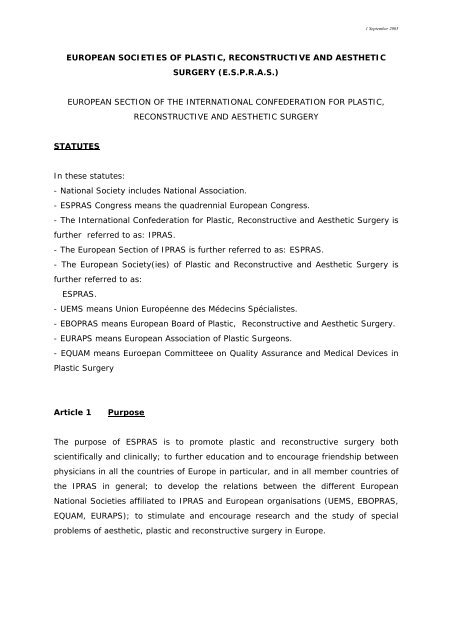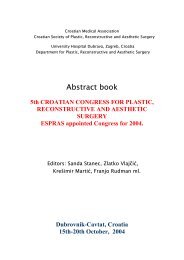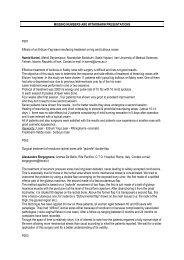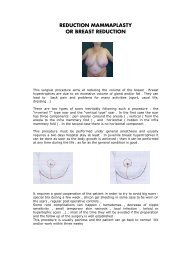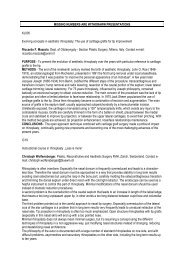Download the Statutes (PDF). - ESPRAS
Download the Statutes (PDF). - ESPRAS
Download the Statutes (PDF). - ESPRAS
You also want an ePaper? Increase the reach of your titles
YUMPU automatically turns print PDFs into web optimized ePapers that Google loves.
1 September 2005<br />
EUROPEAN SOCIETIES OF PLASTIC, RECONSTRUCTIVE AND AESTHETIC<br />
SURGERY (E.S.P.R.A.S.)<br />
EUROPEAN SECTION OF THE INTERNATIONAL CONFEDERATION FOR PLASTIC,<br />
STATUTES<br />
In <strong>the</strong>se statutes:<br />
RECONSTRUCTIVE AND AESTHETIC SURGERY<br />
- National Society includes National Association.<br />
- <strong>ESPRAS</strong> Congress means <strong>the</strong> quadrennial European Congress.<br />
- The International Confederation for Plastic, Reconstructive and Aes<strong>the</strong>tic Surgery is<br />
fur<strong>the</strong>r referred to as: IPRAS.<br />
- The European Section of IPRAS is fur<strong>the</strong>r referred to as: <strong>ESPRAS</strong>.<br />
- The European Society(ies) of Plastic and Reconstructive and Aes<strong>the</strong>tic Surgery is<br />
fur<strong>the</strong>r referred to as:<br />
<strong>ESPRAS</strong>.<br />
- UEMS means Union Européenne des Médecins Spécialistes.<br />
- EBOPRAS means European Board of Plastic, Reconstructive and Aes<strong>the</strong>tic Surgery.<br />
- EURAPS means European Association of Plastic Surgeons.<br />
- EQUAM means Euroepan Committeee on Quality Assurance and Medical Devices in<br />
Plastic Surgery<br />
Article 1 Purpose<br />
The purpose of <strong>ESPRAS</strong> is to promote plastic and reconstructive surgery both<br />
scientifically and clinically; to fur<strong>the</strong>r education and to encourage friendship between<br />
physicians in all <strong>the</strong> countries of Europe in particular, and in all member countries of<br />
<strong>the</strong> IPRAS in general; to develop <strong>the</strong> relations between <strong>the</strong> different European<br />
National Societies affiliated to IPRAS and European organisations (UEMS, EBOPRAS,<br />
EQUAM, EURAPS); to stimulate and encourage research and <strong>the</strong> study of special<br />
problems of aes<strong>the</strong>tic, plastic and reconstructive surgery in Europe.
Article 2 Membership<br />
<strong>ESPRAS</strong> is composed of all <strong>the</strong> National Societies of Plastic, Reconstructive and<br />
Aes<strong>the</strong>tic Surgery in Europe affiliated to IPRAS, one from each country. Members of<br />
<strong>the</strong> affiliated National Societies are entitled to take part in <strong>the</strong> <strong>ESPRAS</strong> Congress and<br />
to vote at its business meetings.<br />
A National Society may only apply for membership of <strong>ESPRAS</strong> once it is affiliated to<br />
IPRAS.<br />
Article 3 Organisation<br />
The business of <strong>ESPRAS</strong> shall be conducted by an Executive Committee, a Council of<br />
Delegates and <strong>the</strong><br />
General Assembly.<br />
Article 4 Executive Committee<br />
a. The Executive Committee (fur<strong>the</strong>r referred to as ExCo) shall consist of nine<br />
members: one member from Nor<strong>the</strong>rn Europe and two from each of <strong>the</strong> o<strong>the</strong>r<br />
four main geographical regions (Western, South-western, Central and Eastern,<br />
and South-eastern Europe – see appendix II for division). They shall appoint a<br />
Chairman (formerly <strong>the</strong> co-ordinator of <strong>the</strong> European Section of IPRAS), a<br />
Secretary, and a Treasurer from amongst <strong>the</strong>m.<br />
b. The ExCo members shall be elected by <strong>the</strong> Council of Delegates and approved by<br />
<strong>the</strong> General Assembly.<br />
c. The members are elected for one period of four years, renewable for a fur<strong>the</strong>r<br />
four years.<br />
d. The ExCo shall elect a Chairman, a Secretary and a Treasurer from its members.<br />
e. The Chairman, <strong>the</strong> Secretary and <strong>the</strong> Treasurer may hold office for a maximum<br />
of eight years following four or eight years as an ExCo member.<br />
f. Representatives of UEMS, EBOPRAS, EQUAM and EURAPS are admitted as<br />
observers to <strong>the</strong><br />
meetings of <strong>the</strong> ExCo with no voting capacity (one representative each).<br />
g. The ExCo shall supervise <strong>the</strong> affairs of <strong>ESPRAS</strong> between <strong>the</strong> quadrennial meetings<br />
of <strong>the</strong> Council of<br />
2
Delegates.<br />
h. The ExCo shall represent <strong>ESPRAS</strong> and its Council of Delegates.<br />
i. The ExCo shall ensure holding <strong>the</strong> quadrennial <strong>ESPRAS</strong> congresses according to<br />
<strong>the</strong> <strong>Statutes</strong>, it shall oversee and assist its organisation and implementation.<br />
j. It shall do <strong>the</strong> same for so-called European-appointed meetings and post-<br />
graduate courses in<br />
collaboration with national European Societies who will host <strong>the</strong>m.<br />
k. The ExCo shall appoint such committees as are required to conduct <strong>the</strong> business<br />
of <strong>ESPRAS</strong>.<br />
l. All ExCo actions and <strong>the</strong> minutes of its deliberations shall be presented to <strong>the</strong><br />
Council of Delegates for approval and ratification.<br />
m. No ExCo member shall be permitted to participate in discussion or debate or vote,<br />
if his National Society is in arrears of its annual dues.<br />
Once a member of <strong>the</strong> ExCo, an officer is responsible to <strong>ESPRAS</strong> and no longer to his<br />
National Society.<br />
The ExCo shall meet at least once a year and in any case on <strong>the</strong> occasion of <strong>the</strong><br />
<strong>ESPRAS</strong>- and IPRAS-<br />
Congresses. It shall report on <strong>the</strong> activities of <strong>ESPRAS</strong> in <strong>the</strong> newsletter of IPRAS<br />
(Globalplast).<br />
The organiser of <strong>the</strong> next <strong>ESPRAS</strong> Congress shall participate in <strong>the</strong> ExCo Business<br />
meetings, with <strong>the</strong> same voting powers as <strong>the</strong> members.<br />
Article 5 Council of Delegates<br />
The Council of Delegates shall be <strong>the</strong> main decision making body of <strong>ESPRAS</strong>.<br />
The <strong>ESPRAS</strong> Council of Delegates shall be composed of one delegate from each of<br />
<strong>the</strong> affiliated National Societies. The delegates are nominated by <strong>the</strong> respective<br />
National Societies. The delegate is <strong>the</strong> spokesperson for <strong>the</strong> National Society to<br />
<strong>ESPRAS</strong> and from <strong>ESPRAS</strong> to <strong>the</strong> National Society. Where a National Society is<br />
represented on <strong>the</strong> ExCo, it shall nominate ano<strong>the</strong>r member as its Delegate to <strong>the</strong><br />
Council. All ExCo members are full members of <strong>the</strong> Council of Delegates.<br />
3
National delegates may not participate in <strong>the</strong> discussions and debates of <strong>the</strong> Council<br />
of Delegates nor may <strong>the</strong>y vote, if <strong>the</strong>ir National Society is in arrears in payments of<br />
its dues.<br />
The Council shall meet in session every four years, in conjunction with <strong>the</strong> <strong>ESPRAS</strong><br />
Congress. The meeting shall be presided by <strong>the</strong> ExCo Chairman. The Council<br />
of Delegates has <strong>the</strong> following responsibilities:<br />
a. to receive reports and recommendations from <strong>the</strong> ExCo and comments from <strong>the</strong><br />
General Assembly and to discuss <strong>the</strong>se and to take <strong>the</strong> necessary actions;<br />
b. to receive and ratify <strong>the</strong> minutes of meetings, financial reports and budgets and<br />
expenditures, and <strong>the</strong> actions of <strong>the</strong> ExCo;<br />
c. to elect <strong>the</strong> members of <strong>the</strong> ExCo;<br />
d. to approve or disapprove <strong>the</strong> applications of National Societies for <strong>ESPRAS</strong><br />
membership;<br />
e. to decide which member country should be invited to host and organise <strong>the</strong> next<br />
Congress after hearing presentations by <strong>the</strong> prospective host countries and <strong>the</strong><br />
recommendations of <strong>the</strong> ExCo;<br />
f. to review <strong>the</strong> finances of <strong>ESPRAS</strong> from <strong>the</strong> Audit Committee report (article 10);<br />
g. to fix on a quadrennial basis <strong>the</strong> level of <strong>the</strong> dues to be paid by affiliated National<br />
Societies.<br />
The Council of Delegates is chaired by <strong>the</strong> chairman of <strong>the</strong> ExCo.<br />
Article 6 General Assembly<br />
The General Assembly shall consist of all those members attending <strong>the</strong> <strong>ESPRAS</strong><br />
quadrennial congress and who are members of an affiliated National Society.<br />
a. The General Assembly shall meet at each quadrennial congress.<br />
b. The ExCo Chairman shall chair <strong>the</strong> meeting.<br />
c. The General Assembly shall receive reports of <strong>the</strong> ExCo and <strong>the</strong> Council of<br />
Delegates.<br />
d. These reports shall include overview of current <strong>ESPRAS</strong> affairs; finances of<br />
<strong>ESPRAS</strong>; proposals for future congress sites; proposals for elections.<br />
e. The General Assembly shall make recommendations to <strong>the</strong>ir respective national<br />
delegates on appropriate actions to be taken in or by <strong>the</strong> Council of Delegates.<br />
4
f. The General Assmebly shall receive proposals from <strong>the</strong> Organising Committees of<br />
<strong>the</strong> cities that are candidates to host <strong>the</strong> next congress.<br />
Article 7.a. <strong>ESPRAS</strong> Congress<br />
The <strong>ESPRAS</strong> Congress shall be held every four years in a city of a European country<br />
whose National<br />
Society is affiliated to IPRAS.<br />
A National Society wishing to propose a host city for <strong>the</strong> Congress must apply in<br />
writing and must include <strong>the</strong> names of <strong>the</strong> members of <strong>the</strong> Organising Committee<br />
elect. The applications must be in <strong>the</strong> hands of <strong>the</strong> ExCo no later than one year<br />
before <strong>the</strong> Congress immediately preceding <strong>the</strong> one to which <strong>the</strong> application refers.<br />
Any promotional material should be sent exclusively to <strong>the</strong> ExCo through <strong>the</strong> Exco<br />
Secretary and not to <strong>the</strong> membership at large. The applicant country must have paid<br />
its membership dues to <strong>the</strong> Section before <strong>the</strong> application.<br />
The site of <strong>the</strong> quadrennial congress shall be selected by <strong>the</strong> Council of Delegates<br />
after recommendations by <strong>the</strong> ExCo. Selection of <strong>the</strong> host city shall be determined<br />
by simple majority of a secret vote. In <strong>the</strong> case of more than two nominees, after<br />
each secret ballot <strong>the</strong> nominee with <strong>the</strong> smallest vote count shall be eliminated.<br />
The organisation, <strong>the</strong> scientific programme and <strong>the</strong> costs and budgetting of <strong>the</strong><br />
congress rest entirely with<br />
<strong>the</strong> host organisation which also appoints <strong>the</strong> President of <strong>the</strong> Congress, Congress<br />
Committees, etc. The organising committee of <strong>the</strong> host National Society shall<br />
assume all responsibility for <strong>the</strong> administration of <strong>the</strong> congress including scientific<br />
programming, administration, execution, and finances. The host committee should<br />
consider a profit-sharing arrangement with <strong>ESPRAS</strong> at <strong>the</strong> conclusion of a successful<br />
congress.<br />
The host Society, before announcing <strong>the</strong> congress, shall submit a general draft of <strong>the</strong><br />
congress scientific programme, <strong>the</strong> site, hotel space, social activities, travel<br />
arrangements, budget and organising committee framework to <strong>the</strong> ExCo. This<br />
program shall allocate time for <strong>the</strong> business meetings of <strong>the</strong> Exco, <strong>the</strong> Council of<br />
Delegates and <strong>the</strong> General Assembly of <strong>the</strong> Congress.<br />
5
The host organising committee shall invite <strong>the</strong> members of all affiliated National<br />
Societies to participate in <strong>the</strong> scientific program. It shall, at least one year in<br />
advance, send preliminary information on <strong>the</strong> planned congress to each individual<br />
member of <strong>the</strong> affiliated National Societies.<br />
The official language of <strong>the</strong> quadrennial congress shall be English and all papers<br />
must be presented in English. Scientific papers may be given in o<strong>the</strong>r languages only<br />
if simultaneous translation into English is available.<br />
Article 7.b. European-Appointed meetings<br />
A “European-Appointed Meeting of <strong>the</strong> Year” will normally be appointed by <strong>ESPRAS</strong> in<br />
each of <strong>the</strong> years between <strong>the</strong> quadrennial congresses. This is a National Society’s<br />
scientific meeting, to which members of all European National Societies are eligible<br />
to participate on <strong>the</strong> same terms as members of <strong>the</strong> National Society. The meeting<br />
shall be endorsed by <strong>the</strong> <strong>ESPRAS</strong> ExCo.<br />
Article 8 Congress Membership<br />
All members of affiliated National Societies are eligible to register and, upon payment<br />
of a registration fee, attend <strong>the</strong> scientific congress.<br />
All o<strong>the</strong>r persons can only attend upon invitation by <strong>the</strong> host society organising <strong>the</strong><br />
congress.<br />
Plastic Surgeons who are not members of a National Society which is affiliated to<br />
IPRAS cannot be registered for <strong>the</strong>se meetings and are not allowed to participate.<br />
Congress members, inlcuding trainees, family members and guests, shall pay a<br />
congress registration fee to be determined by <strong>the</strong> Organising Committee of each<br />
Congress.<br />
6
Article 9 Votes and Rules<br />
All votes in <strong>the</strong> Council of Delegates and <strong>the</strong> ExCo shall be decided by a simple<br />
majority, except revisions of <strong>the</strong> statutes, election of officers, and selection of <strong>the</strong><br />
congress site: <strong>the</strong>se shall be by 2/3 majority vote.<br />
Tie votes shall be decided by a vote cast by <strong>the</strong> Chairman. Votes by written or<br />
electronic mail may be utilised to decide on business by <strong>the</strong> ExCo and Council of<br />
Delegates; all such mail ballots shall be ratified by <strong>the</strong> Council of Delegates at its<br />
next meeting. Delegates may only vote, if <strong>the</strong>ir Association is not in arrears in<br />
payments of its dues.<br />
Notice of a suggested change in <strong>the</strong> <strong>Statutes</strong> shall be given by a National Society<br />
officer to <strong>the</strong> ExCo through its Chairman at least three months before <strong>the</strong> ExCo and<br />
Council meetings. A report on all <strong>the</strong> proposed changes shall be made by <strong>the</strong> ExCo to<br />
<strong>the</strong> Council of Delegates. The <strong>Statutes</strong> may <strong>the</strong>n be changed by majority vote of <strong>the</strong><br />
Council of Delegates. The <strong>Statutes</strong> need <strong>the</strong> approval of <strong>the</strong> IPRAS ExCo.<br />
Article 10 Dues and Finance<br />
The funds of <strong>ESPRAS</strong> shall consist of an annual subscription fee levied on each<br />
European National Society on a per capita basis of total active membership for <strong>the</strong><br />
current year. Each National Society shall pay annual dues on a per capita basis. Dues<br />
shall be paid on a yearly basis, in advance, in <strong>the</strong> first quarter of <strong>the</strong> calendar year.<br />
National Societies in arrears in payments of <strong>the</strong>ir dues shall have no right to vote in<br />
<strong>the</strong> ExCo and <strong>the</strong> Council of Delegates meetings. The ExCo has <strong>the</strong> right to delete<br />
<strong>the</strong> name of that Society from <strong>the</strong> website.<br />
The level of dues shall be determined by <strong>the</strong> Council of Delegates on proposal of <strong>the</strong><br />
ExCo at <strong>the</strong> immediately preceding congress for each ensuing four year cycle. The<br />
dues are to be paid to <strong>the</strong> Treasurer of <strong>ESPRAS</strong>.<br />
Additional funds may be obtained by donations, bequests, sponsorship or subsidies<br />
from various<br />
sources.<br />
The finances of <strong>ESPRAS</strong> shall be independent of <strong>the</strong> finances of <strong>the</strong> <strong>ESPRAS</strong><br />
Congress. If <strong>the</strong> Organising Committee of <strong>the</strong> quadrennial <strong>ESPRAS</strong> Congress so<br />
7
desires, it may donate in whole or in part any surplus from <strong>the</strong> Congress to <strong>the</strong><br />
<strong>ESPRAS</strong> Treasury.<br />
A proportion of <strong>the</strong> registration fees for <strong>the</strong> Post-Graduate Courses referred to in<br />
Article 4.i will be retained by <strong>ESPRAS</strong>, <strong>the</strong> amount being determined in agreement<br />
between <strong>the</strong> ExCo and <strong>the</strong> officers of <strong>the</strong><br />
National Society organising <strong>the</strong> Course. The <strong>ESPRAS</strong> shall use its funds only to<br />
accomplish <strong>the</strong> purposes specified in article 1 of <strong>the</strong>se statutes.<br />
An Audit Committee shall be charged with <strong>the</strong> quadrennial (or more frequently if<br />
desired) review of <strong>the</strong> financial affairs of <strong>ESPRAS</strong>. The Audit Committee shall consist<br />
of three members appointed by <strong>the</strong> ExCo. The Audit Committee shall present its<br />
report to <strong>the</strong> ExCo.<br />
Article 11 Amendments and Conflicts<br />
Suggested changes to <strong>the</strong> statutes may be submitted to <strong>the</strong> Secretary at least twelve<br />
months prior to <strong>the</strong> succeeding quadrennial Council of Delegates meeting. The<br />
proposed changes may only be adopted by <strong>the</strong> Council of Delegates, voting at a<br />
scheduled meeting. Amendments to <strong>the</strong> statutes require a 2/3 majority of <strong>the</strong> voring<br />
members of <strong>the</strong> Council of Delegates.<br />
All matters in which conflicts are not resolved by <strong>the</strong>se <strong>Statutes</strong>, shall be referred to<br />
<strong>the</strong> IPRAS ExCo through <strong>the</strong> IPRAS secretary-general.<br />
Article 12 Dissolution<br />
In <strong>the</strong> event of <strong>the</strong> dissolution of <strong>ESPRAS</strong>, <strong>the</strong> ExCo, acting with <strong>the</strong> authority of <strong>the</strong><br />
Council of Delegates, shall, after satisfying all liabilities of <strong>ESPRAS</strong> and with consent<br />
of <strong>the</strong> IPRAS ExCo, distribute all remaining assets to such organisation(s) operated<br />
for one or more of <strong>the</strong> purposes contained in <strong>the</strong>se statutes, or to such charitable,<br />
educational, and/or scientific organisations as shall qualify.<br />
8
Appendix II – European Division in Five Regions with number of members<br />
per country as of 31 December 2004 (35 countries)<br />
North (one delegate)<br />
Denmark 97<br />
Finland 45<br />
Iceland 9<br />
Norway 56<br />
Sweden 135<br />
Total 342<br />
West (two delegates)<br />
Belgium 76<br />
Germany 290<br />
Ireland 16<br />
Luxemburg 5<br />
Ne<strong>the</strong>rlands 140<br />
Sitzerland 94<br />
United Kingdom 286<br />
Total 907<br />
South-west (two delegates)<br />
France 262<br />
Italy 328<br />
Portugal 60<br />
Spain 327<br />
Total 974<br />
Central and East (two delegates)<br />
Austria 51<br />
Czech Republic 41<br />
Estonia<br />
Georgia 20<br />
Hungary 98<br />
Latvia 16<br />
Lithuania 21<br />
9
Poland 114<br />
Russia 542<br />
Slovakia 16<br />
Total 919<br />
South-east (two delegates)<br />
Bulgaria 23<br />
Croatia 34<br />
Cyprus 13<br />
Greece 140<br />
Macedonia 6<br />
Moldavia<br />
Romania 178<br />
Slovenia 13<br />
Turkey 264<br />
Yugoslavia 37<br />
Total 530<br />
10


